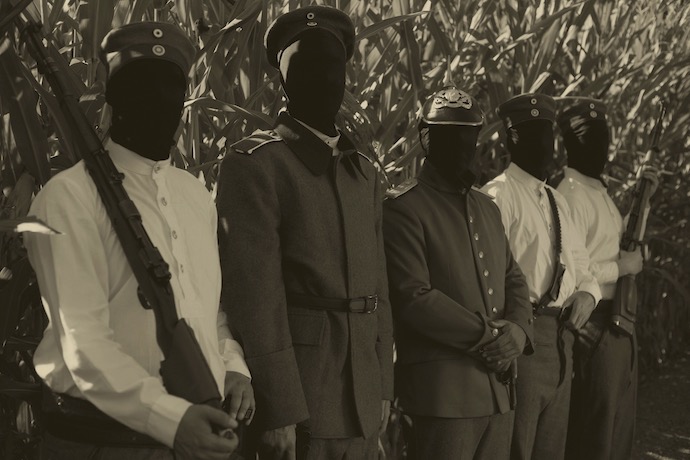
(Comrade Aleks delivered to us this interview of the German artist Noise, who is the man behind both Kanonenfieber and Leiþa, and a project named Impious. Due to no fault of Aleks or Noise, we allowed more than a month to go by before publishing it — but reading it now (and listening to the music) makes for a very good way to help begin the New Year.)
Black /death metal one-man band Kanonenfieber, which is focused on themes of World War I, and the depressive black metal project Leiþa have common origins – both are based in Bamberg, Bavaria and both are run by Noise. He launched Kanonenfieber’s first full-length Menschenmühle in February 2021 and Leiþa’s Sisyphus followed it in June 2021. It’s not just cool furious outbursts of anger and desperation but two very different works with very different stories behind them. And I’m glad what we managed to do this interview with Noise, which is here for you to read.
Hi Noise! Thanks for your time, it’s much appreciated. And let’s try to sort out from the start — you run two solo projects: Leiþa and Kanonenfieber. Both were born around a year ago, both had their debut albums released in 2021. How did it happen that you split your creative flow in two slightly different directions?
Kanonenfieber was born in September of 2020 and Leiþa in March 2021, right after the release of Kanonenfieber’s Menschenmühle.
So there was quite some time between those two projects. And indeed my life kind of changed after the release of Menschenmühle, as it was the first time my music got real recognition. The instrumentation of Sisyphus is way more complicated and profound than the straight-forward melodic black/death metal on Menschenmühle. What in the end comes as a result of the topics I chose for the different projects.
There was much stuff going on at that time, so Leiþa was the logical result to me. The approach of Sisyphus is more emotional and personal than the topic of Menschenmühle. Kanonenfieber’s debut was my attempt to capture the feelings from the stories and letters I had from soldiers of WWI.
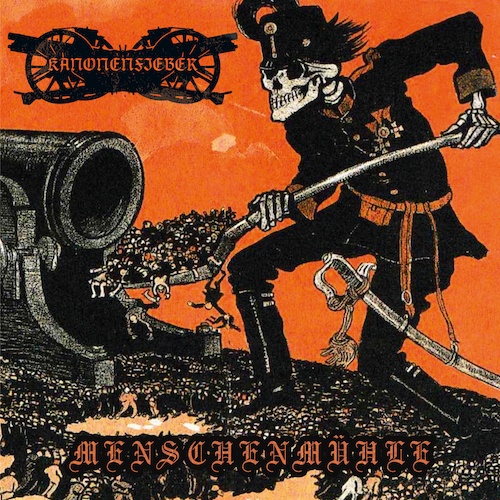
You released both albums, Leiþa’s Sisyphus and Kanonenfieber’s Menschenmühle, on your own label Noisebringer Records, and you managed to do not only a CD-edition but also vinyl for Kanonenfieber. Are you that serious regarding releasing and promoting your music?
First, Noisebringer Records isn’t my label. I was the driving power behind setting it up but it isn’t led by me. I‘m just the musician.
Yes, we did go for CD‘s at first. All in all there were initially 300 CD‘s set up as preorder. And I was super-scared that we wouldn’t sell those. After Menschenmühle was released those 300 CD‘s were sold out so quickly that we made it a run of 600 limited CD‘s. Then we looked for the right vinyl pressing company and found out that pressing vinyl nowadays is a huge pain in the ass. Very expensive and the waiting times are terrible!
But yeah, we managed to get a decent company, set up a pre-order, and here we go. As the demand was so high and people were getting kind of aggressive (in a good way) we made shirts, patches, pins, longsleeves, and zippers as well.
Starting off Noisebringer with Kanonenfieber as the first band was a baptism of fire. Setting up an online-shop, getting used to the postage of all those parcels, getting the contacts you need. Some real pains in the ass. So, I am glad to be part of this team and what we accomplished so far! So yeah, we are as serious with these projects as it gets!
How successful was this approach? Can you say you put in enough effort to reach as many listeners as you could?
I‘d say you can never reach as many listeners as you could have. I mean, we do not have the financial background or the contacts an established label would have. But we tried our best. In the end, platforms like Facebook, Instagram, and YouTube helped a lot. People kept sharing the music, magazines started writing reviews, and streams were going crazy.
A month after the release I started a Spotify account for Kanonenfieber, as Menschenmühle was only available at YouTube and Bandcamp. So as you see, I had no idea how to release an album properly. I just did what my listeners suggested me to do. I heard what they were saying as I was reading every comment, and replied to as many as I could. There was no hundred-thousand-dollar marketing campaign going on like you would see it with an Amon Amarth LP. Like youngsters on the internet would say, it just blew up. And if you are taking a look at the numbers they have been constantly growing since it was released.
What is your musical background? Did you play in bands before? Or are these two albums kind of a result of some outside influences?
I‘ve been playing music since I was 4 years old. That said, I have no idea of music theory. I can’t read a single note. I played in a few bands as drummer, guitarist, and bassist. The songwriting process in those bands was so slow and unsatisfying that I started writing and recording music on my own. So if you are listening to something released by Noisebringer, you can be sure that everything was written by me. I just got a live drummer who plays some tracks under my guidance. His name is Noderra and he is hell of a drummer. You will hear more of his playing on my next releases!
With Kanonenfieber’s Menschenmühleon you “commemorate the countless victims of World War I”. What attracted you to this theme? There aren’t many bands who write songs about this period.
The attraction came from an old diary from my great-grandfather. Together with a friend of mine we translated it from old German into actual German as a present for my grandmother. Together with that friend, who is a hobby historian, I came up with the idea of making an LP that covers the horror of WWI.
The interest in war itself comes with my interest in history. And there is nothing that wrote as much history as wars did. Indeed I watched all the war-themed movies and read tons of books. That said, I don’t enjoy the blood and the gore. It‘s more about the mindset those soldiers had and the fascination for what they went through. Starving, sleepless, near frozen to death. Human beings who still managed to come home to their beloved ones after several years of constant fighting. That is impressive.
I think it’s right to remind people what real war means, because we have no time or sometimes desire to think it over. We, as humans, tend to repeat the same mistakes as our grandfathers did. And yet even when bands give us food for our brains, we tend to ignore it, seeing it only as entertainment. So do you see music also as an instrument to stimulate your listeners, to make them think?
It‘s exactly how you mentioned. As one war on this world ends, somewhere else on this planet another war begins. But this is human nature I guess. We love competition and to put ourselves above others. With some people this desire is more pronounced, with other less.
I don’t see myself in a position to instruct others. I try even less to influence people’s opinions. With Menschenmühle I just tried to give people something to think about, as you mentioned. The album doesn’t reflect my opinion, it’s a historical treatise that speaks for itself. But if you take your time to read the lyrics and try to empathise them, you will understand the intention.
As the lyrics are based on letters and reports from those soldiers fighting and dying in WW1 you won’t find pleasant words. I at least did not find one letter that was glorifying this mass slaughter. You have to see Menschenmühle as a documentary. What you take away from it stays with you.
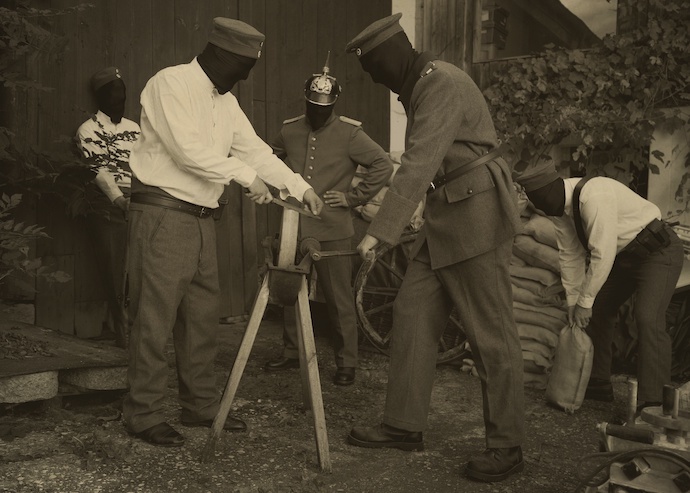
You say what the lyrical background of Menschenmühle is based on factual reports, letters, and other documents from the surviving and deceased soldiers. How long did you work over the lyrical side of the album?
For the lyrics my historian friend and I figured out together in which direction it should go. We decided that we would make the album as historically correct as possible. Real stories from real people living and dying in the trenches in WWI.
My friend has a collection of letters from WWI. He got them from his neighbours, family, and friends. So the people who are talked about in Menschenmühle are actually ancestors of my friends neighbours. I took those letters, read a lot of reports, watched all the movies all over again, and started writing lyrics. All in all, the process of writing lyrics took half a year. It was the most time-consuming process of writing Menschenmühle, but it was worth every second. I learned much in that time and I see WWI from another point of view now.
And how long did you write the music itself? Did it take much time to gather all the ideas and put it into one big grim canvas?
The instrumentation was written pretty fast. I started recording the first riffs in September 2020 and finished songwriting in the end of October. So one month and a half. I always start with a riff and then I construct the whole song around it. This is my approach to songwriting ever since.
The hard part is to fit the lyrics to the Instrumentals. You have to re-write everything to make it fit with the instruments. That can be very frustrating.
That said, writing songs is something I really enjoy. I have 5 unfinished albums on my hard drive. I am just too lazy to write and record the missing lyrics or I am not satisfied with the production yet. I have an external hard drive I call “Graveyard”. That thing contains a few hundred songs I never finished.
Everything in the black metal vein?
A large part of it, yes. It‘s my favourite genre and it feels natural to me to write songs in that manner.
That said, I have no genre-borders. I did classical stuff, rock, singer-songwriter, progressive stuff, and so on. I record everything that comes to my mind.
You recorded everything on your own in Kanonenfieber, but you invited a companion for recording Leiþa’s Sisyphus. What’s the technical difference? Are Sisyphus’ drums parts more complicated for you?
I recorded the drums for Kanonenfieber on my e-drums. So in the end it is a sampled drumkit you are hearing. Still, I played the songs on the drumkit to give them a more natural feeling. If you just program the midi-files it sounds robotic and unrealistic. I don’t have a treated room in which I could record acoustic drums so I had to stick with the e-drums method.
For Leiþa I wanted a raw production with acoustic drums. Noderra is a beast. He gave Sisyphus a touch of playfulness with all those ghostnotes, off-beats, and details. I am very pleased with what he did. I could never play the drums the way he did.
“Doubt and self-loathing” form the basis of the Sisyphus album, and the myth of Sisyphus reflects the idea of both perfectly. How did you get that you needed another project besides Kanonenfieber to ease some pressure?
Yeah, easing pressure is always the reason I write music I‘d say. As Kanonenfieber has these war aesthetics I couldn’t go too crazy in terms of the instrumentation. Everything is pretty much straight-forward. For Leiþa I wanted to go depressed and artistic in terms of instrumentation and lyrics. You get these tangled and reversing melodies, crazy song structures, and uncommon time signatures, paired with deep, dark, and depressed lyrics. Writing the lyrics had a cathartic feeling to me.
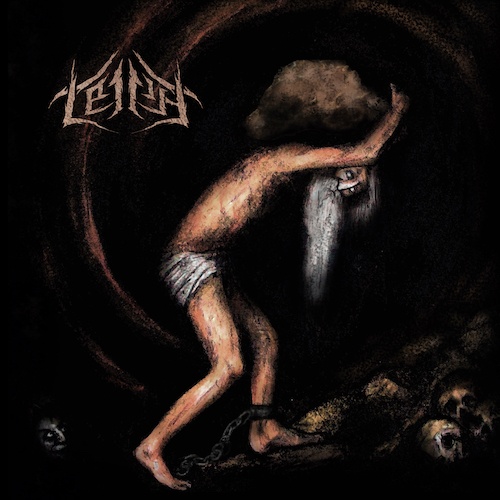
And the big deal regarding both projects is that you got some feedback for Menschenmühleon and Sisyphus... Did this response give you some conclusion concerning the projects’ demands?
Kanonenfieber overall did overwhelmingly well in terms of feedback. I mean, I set up a live band, we are playing a European tour, I got many good reviews from well-known magazines and blogs, and I am in contact with some of my musical idols. And finally I am having an interview with No Clean Singing in this moment. I think that says it all!
The demand for Kanonenfieber is high I‘d say. People are asking for new material all the time. Leiþa on the other hand didn’t do that well, in comparison to Kanonenfieber. It was well-received though and I got good feedback as well, but it didn’t “blow-up“. But that is totally fine. I wrote it for myself and it wasn’t meant to be mass-friendly. It was a relief for me to write Sisyphus and this is what matters.
Both projects have the potential and space for development. Are you ready to keep on running both of them further at the same time?
Sure I am ready! I am constantly writing music and I have a good bunch of new material for Kanonenfieber that is waiting to be released in 2022. For Leiþa it will take a little longer. This project needs the right mindset.
Currently I am working on two new projects which I plan to release in late 2021 and early 2022. The recordings for both LP’s are nearly finished and I am currently mixing and mastering the first one. Still a lot to do, but I hope the first single will be out in November. It will be black, it will be raw, and it will be melodic. That is all I can reveal for now.
EDITOR’S NOTE: Because of my delay in publishing this interview, it does indeed appear that a new Noise album under the name Impious is now set for release by Noisebringer in March 2022, and that a first single is now out in the world:
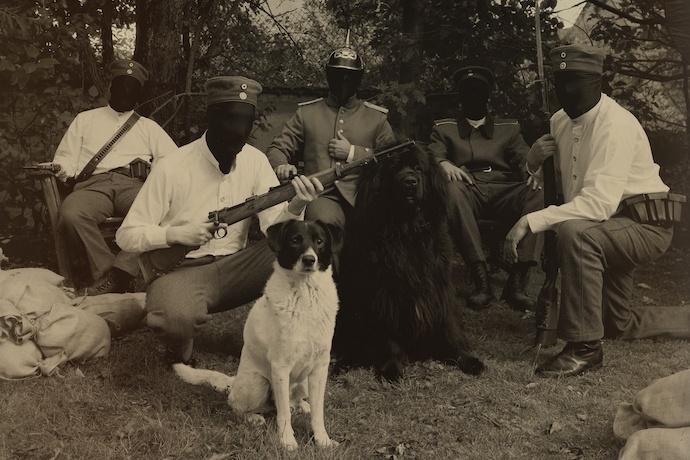
Okay, I got you. However, will you build further Kanonenfieber albums around the WWI theme?
There will material coming out from Kanonenfieber that still has this WWI topic.
That said, for the next LP I planned to go a few hundred years back in time to the Thirty Years War. My historian friend and I already figured out the topics that I will write the lyrics about. I have some great sources for my investigations, as the Thirty Years War was so prominant in the region I live in. There are some archives to be visited and old manuscripts to be read!
Do you plan to release all the new projects through Noisebringer Records again or do you have another label this time?
We do co-productions with Avantgarde Music, which is a big name in the scene. We made the second run of Menschenmühle vinyls together. As the second pressing just sold out we are having the third run coming in December. Avantgarde is managed by great guys and we get along pretty well. We have a good appointment and everybody is happy with the terms and conditions.
I had requests coming in from well-known indie and major labels from all over the world. But I am happy with the current situation, so why change it?
I will work together with other labels here and there for sure, but the main portion of my music will be released through Noisebringer Records. Maybe I‘ll change my mind if the “right offer“ appears, but that didn’t happen so far. As my projects grow, Noisebringer grows. Maybe we will be able to sign bands beside my projects as well at some point. But that’s all future music.
Thanks for the interview Noise! It was both interesting and stimulating. How would you like to finish it?
Thank you for those intense questions! I had a good time answering those.
A few last words from my side. The last two years were hard for musicians, bands, and the whole music industry. I don’t want to talk about the “C-word“ but you know what I mean. Go out to shows if possible, support your local bands, and start living music again.
Thanks to everyone who made it this far, it means a lot to me. Have a good one.
https://www.facebook.com/NoisebringerRecords
https://noisebringer-records.bandcamp.com/
https://www.facebook.com/Kanonenfieber

This was a great interview; I love both of those albums and had no idea the same guy was behind both!